Humanism, blues, bodies and burials...
Dr Matthew Engelke, an award winning anthropologist,
specialises in the anthropology of religion.
He received funding in 2011 to undertake ethnographic
research on the British Humanist Association, through which
he hopes to examine the nature of ‘non-religion’, the
relationships between humanism and atheism, and
humanist commitments to human rights.
He has kindly allowed the BJwebzine to reproduce his unedited ‘improvised free thought’ transcription of an interview with Billy he conducted, over home made beetroot soup, at the musician and humanist funeral officiant’s home in early 2011. They had just returned, together with Isabel Russo, one of Billy’s BHA colleagues, from a funeral conducted by Billy at a local crematorium.
In it, Jenkins discusses his work [2008-2014] as a humanist funeral officiant and how his philosophy to life (and death) evolved from a young age.
You can find out more about Matthew Engelke's work here.
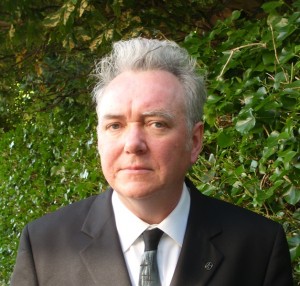
Billy Jenkins. At Your Service. Literally....
ME: Great, well, so, I’m speaking this afternoon with Billy Jenkins, a humanist celebrant, and, Billy, I’ve just been obviously telling you about my, where I’m coming from, and I do want to get to the funeral that we just, that I just witnessed, but why don’t we start with your background, and how you got to where you are today, not only as a celebrant, but as a humanist, or atheist, or whatever, frankly, you want to call yourself – I won’t, ah...
BJ: Ok, well, I can tell you first of all, I never use the word ‘celebrant’, I use the word ‘officiant’ – I was told – I questioned both words when I first trained, and, um, and the word ‘minister’, and they said, oh, no, you can’t use that, that’s too religious, and I said, what, like Minister of Transport, like that’s religious, is it? No, you’re either a celebrant or an officiant, and I said well, I’m not going to use ‘celebrant’ when I phone up a father whose 8-year-old child’s just been killed in a car crash and say, ‘Hey, we’re here to celebrate her life’, I’m not going to say that. ‘Officiant’ is a mouthful, so I went to church for the first time in 45 years last summer, to a little village in Gloucestershire, and they don’t have vicars now, they have celebrants, so that’s [like the] High Anglican church, so they use ‘celebrant’, that makes me laugh.
So it’s semantics, and metaphor, and heaven, hell...as a musician and composer, one often talks about heart and soul in songs, it’s all metaphor, as is heaven and hell, it’s just a metaphor, simple as that. So therefore – and I don’t like the word atheist, because to me, as Mary Warnock just wrote in her recent book, it implies that that person is acknowledging that there is a God in other people, but for me there isn’t a God. And for me, the world is full of gods and myths, but it’s all wonderful mythology. And even since I was a four-year-old, first time I was four, [because] my parents were very committed Church of England, my uncle was a bishop, in England in the 80s, a very controversial one.
So both my parents, my father and his brother were brought up,
you know, good believers, but they never forced it on me. When
my grandmother fell down the stairs, I was about four, I just
thought, well, what’s that all about? If there’s supposed to be
a benign, benevolent God up there, what’s she ever done to
deserve being pushed down the stairs? And then we’re all shoving
up to Sunday school for the sermon – ‘Anyone you want to pray
for?’ And I said – ‘Yes, Dave Mackay, Tottenham Hotspur
footballer, he’s just broken his leg for the second time after
being out for 9 months.’ She said, [puts on snotty, posh voice]
‘Oh, we don’t pray for people like that’, so...
And in nursery school, I said first day in nur-, this is, I’ve written songs about this, ‘First Day in Hell’, a nursery school run by a supposedly good Christian lady, and, you know, I wasn’t used to kids, I’d lived my own little life in my big garden, and I liked solitude as a kid, and suddenly I’m thrown into all these other noisy kids and I just couldn’t cope, so I was crying me eyes out, she said ‘You snivelly little, if you don’t shut up, I’ll [snap] your leg!’ So, I dunno, so you’re in church on Sunday, all dressed up nice, and I just thought, this is [inaudible], I’m not happy about this.
Then my mate, I was about nine, he said – ‘Come and sing at the parish church choir, you get paid ten shillings and two and six a wedding’, so I went round there, for the money. And I must have been quite good, because I was picked to go in the special choir up at Westminster Abbey and St Paul’s on Monday nights, and sing – I used to go up by meself, aged about 10, on the train, and do things up there. So I saw it from the other side, and on a Saturday if you were lucky, you did, I did up to five weddings, and – full circle – and even then, you were having to, sort of, he’d pick the pace up, the choirmaster, cos of the timing, cos, you know, one after the other. And I think once I made ten and sixpence, or ten shillings in one...no, 12 and 6 it was, in one Saturday, which was a lot of money, 60p in this day and age.
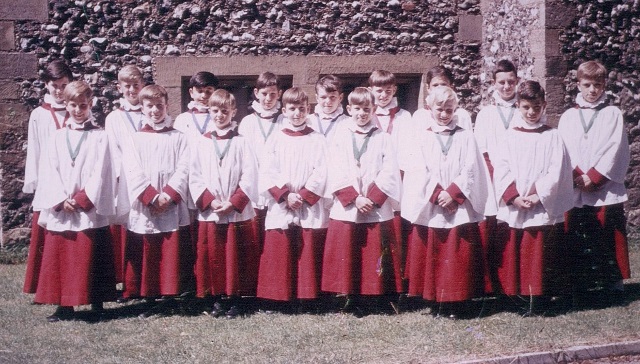
Bromley Parish Church choir 1966. Billy in centre of
back row.
So I saw it from the other side. The highlight of my choral career was, apart from singing a couple of solos, was a midnight mass when we had candles in yoghurt pots, and I said to everyone, well, stuff them half full of paper, so about 20 minutes in, they all caught fire, I thought it was brilliant! [laughs a bit] And I used to organise bicycle races round the church and the consecrated ground, until two little kids skidded on the moss-covered, you know, the pathway where the old tombstones, were, gravestones, and they got trapped in amongst this [inaudible] and [they] couldn’t get them out, so we had to get the choirmaster, and so that got banned.
So I’ve always sort of felt that way, really. And then we were writing songs in the early 80s, satirical songs, ‘The World is Fantastic’, about a fundamental Christian who had a terrible life, and everything went wrong and, you know, all disease, and dog died, you know, all the clichés, and then he eventually he gets to heaven, and of course God has a very rude word, and [anyway] that’s the punchline um...
ME: So it never, I mean from a very young age, it never clicked for you?
BJ: Well, I just thought it was bizarre, I mean I went to a
Church of England school, and we used to have religious studies
with a nun, a very nice nun, I thought she was a strange person,
and my mate Rob, who used to come and sing in the choir [cos
you’d] get paid, we had this little [thing going/theme game],
that, we changed the words round that ‘pub’ meant ‘church’, so
every time she’d be talking about the, we’d be thinking ‘the
pub’, and ‘church’...we were little kids. Um, yeah, it just
didn’t make sense to me.
And then even after – you know, my – as I say, my dad was, my
mum and dad were great, they were very good believers, but they
never forced it down me. Got baptised, and christened, what is
it? Not ordained, what is it?...confirmed. I thought I had to do
that to stay, keep the gig in the church choir. But soon as me
trousers dropped, and I got interested in guitar, and I think
church practice collided – I got in corresponding with Top of
the Pops on TV, so I said, no, I’m not doing this anymore. [I’m
out of here.]
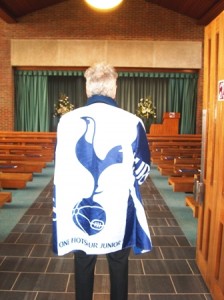
And that’s why I ended up back at church 45 years later, going to what they used to call Matins. And there’s a really weird thing, they go, you know – ‘Make peace with your neighbour’. I thought – what’s that about? What, d’you go like that [gestures]? And they said ‘Yeah. I do a “V” sign’. And then suddenly, and this is like swine fever, there’s all swine fever everywhere, and this is in the country, and I suddenly had these old farmers hugging me, and all that, and going...[laughs] it was so weird! And kids were banging tambourines, I thought – give me the old, I want the boring sermon when you fall asleep, you want a Sunday to drag like heck – again, another song, ‘Whatever Happened to the Weekend?’ Sunday would be the slowest day ever, and you’d be so bored, so you’d be ready for Monday, to get back on that 9-to-5 trot.
ME: So you don’t like ‘atheist’–
BJ: I always felt ‘humanism’ was the logical word, a ‘humanist’, respect for human. Slight dabbling in an adolescent way with existentialism, but not to a great degree. I’m not very well educated at all, [because I] started gigging when I was about 14 and a half, didn’t really go to school after that, so. Read a lot, read a lot of books [along the line]
ME: Uh-huh. Well, if you’re reading Mary Warnock, that’s, you’re doing all right for yourself
BJ: No, I’m reading the press release for Mary Warnock, cos my mate’s the book publicist. [laughs]
ME: Right, so how did you, when did organised humanism, or BHA, or whatever it might be, come on the scene for you?
BJ: In 2001, I think, I brought an album out called ‘Life’,
because at the time, Billy Graham had a campaign, ‘Elif’, it
was, an anagram of ‘life’ – ‘Can you make sense of it’? It was,
like, one of his crusades, which children [or something]
[inaudible] …It was a very good campaign, I think Saatchi and
Saatchi did it, and were doing the Labour and the Tory
governments.
So I just brought out an album called ‘Life’, just after the
Twin Towers thing – and, um, secular, humanist gospel, I call it
– and we got The Freethinker, we sort of sponsored The
Freethinker, they, kind of, ah, and we did a little tour, and we
were sort of pushing The Freethinker, so that was that, really.
And then, the record industry’s gone so smelly, and I can’t stand travelling anymore, I’m exhausted, going up and down motorways, and trying to get an instrument on planes and all that, then I – and singing the blues is like, you know, it’s like testifying in a way, and you’re playing how you feel, and there’s three chords to the blues, the tonic, the subdominant and the fifth, and is that not like the Holy Trinity, it’s the Big Three, and you’ve got these three levels which you vibe off on, and as one gets older, you tend to go to more funerals and one was conducted by Stephanie, Steph Bramwell, for an old friend of mine, I was deeply moved by what she did, other funerals, people would [make/late] diversion to faith, which I thought wasn’t them, and I felt very unhappy observing those funerals, I thought – this isn’t the person.
In fact when we were on the road in the 70s, our soundman – 1977 – our soundman, Tony, and the crew, a big crash on the motorway going up to Nottingham, and he was killed. And [it’s sad] as we decided then in the band, and we had to go to his funeral in Reading, and then that night play our very last gig on borrowed equipment, cos it was all smashed up. And he’d been with us 4 or 5 years, and he was a mate of the co-leader. And his funeral was, yeah, the guy [the priest] was wrong, it was wrong what he was saying about Tony, [it wasn’t right] ...
So I thought, in my mid-fifties I’m old enough, and come back and see my parents had gone, or were going, [well,] we were nursing Jill’s father here for a couple of years. So no, I couldn’t perform for a year because 24/7 we were nursing Richard, with his dementia. Till the social services said ‘You need a break, [mister,] you’re going crazy’. You know, you’re up four times a night catching shit out of his bum, you don’t feel inspired to pick the guitar up and make nice things.
So, with the record industry dying, I just thought, you know, I
applied to join the BHA, because they seemed to me like the only
sensible body, I found the NSS a little bit too political,
really. I’m very much live and let live, you know, I thought if
I’m gonna have a persona as a humanist officiant, I’m the
bumbling vicar that turns a blind eye to anything.
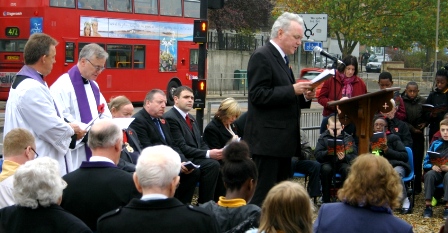
Representing non-believers in the Armed Forces, Co-op Funeralcare, SE18, 11.11.11
And what I didn’t appreciate is the growing sense of community, and, almost like a humanist parish, because as I say, I’ve been doing it two-and-a-half years, I think you just witnessed funeral number, it’s about 60 a year I’ve been doing, this is number 167, I don’t want to do too many, I don’t take too, if I’m not focused and feel I can devoted 100% to them, I won’t take it, I’ll pass it on to a colleague. And I’m getting rebookings, now, same families, and there’s nothing that gives me greater satisfaction than doing local ones, round here, and just, there’s a little park up there, up the road, with millennium stones, and we did a no body funeral, very sad case, [she] was amazing, no-one was allowed to attend the funeral, she killed herself, and the family were ashamed, didn’t approve of her boyfriend, and they buried her at 11 am in Northumberland, just mother and father. So here, 80 of her friends gathered at the same time [sighs with emotion].
On the stroke of 11 o’clock, two flippin’ Northumberland pipers come out of the woods towards us, and we’re standing in this millennium stone circle, so that’s part of the meridian line, so they came out, and they’re not like Scottish bagpipes, they’re softer, so we got them to come out, and come towards us, and it was...so we had a no body funeral. So I didn’t expect that side of what one does, it’s just deeply rewarding. And ironically I did one last Friday for a journalist. John Fordham, the Guardian jazz critic who’s given me so many write-ups in the last 20 years, attended as a colleague of the deceased. I said ‘John, I have to say that the nice letters I received from the grieving means far more than any national newspaper review you might write about my music’, he was, he was...‘[inaudible] is going to do a gig with you, by the way...’
ME: So did you say the, you said local, the local community is very important to you, but did I hear you right, that the growing sense of a kind of humanist community is not what you’re after?
BJ: Well, I think it’s valuable groundwork, I mean take the funeral today, there was 120, do you think? As I say, it’s slightly detached, I didn’t really key into this family, just the, you saw themselves, the way they’re a bit sort of, a bit nuts, in a lovely way, you know, dead straight, dead honest. Didn’t want to show their feelings, perhaps, though they, they did grieve. But often you would be talking to people and, you know, people say – ‘That’s amazing’, ‘What a fantastic–’, and you get the BHA flyers out... So you’re slowly collecting commerce, in a way, and you give them the humanist stuff, and funeral stuff, or things about humanism, whatever they fancy. So two or three of those go each time [I think he’s showing ME some materials], and as I say I get lovely emails from folks saying that so many people have been, in fact, I send in the last two, because they both state that, you know, so many people have realised there’s a whole new different thing out there, and what Isabel said was frightening, you know, about how it does undermine people, scare people.
But what I find, because a lot of it, I’m doing, sort of, Bexley, suburbia, outer suburbia, and if you go in the house and there’s a large TV, three-piece leather suite and no books, odds on, it’s [puts on broad Cockney accent] ‘gotta be “My Way”, he gotta go out to “My Way”’. But they’re all good, honest people that will have been baptised, but they don’t think it ethical to go out that way, because they never attended church, and I really respect that approach. And as Denis Cobell says, who [was] my mentor and one of the first people to do humanist ceremonies in this country, and Barbara Smoker, and both of them are members of the Lewisham Humanist Group, so I’m very lucky to have ... I mean, some of Barbara’s words I probably speak anyway, because she contributed to the Funerals Without God, Denis said ‘Yeah, there’s non-religious funerals and there’s humanist funerals’, and I would say one in ten is die-hard humanism. I always offer the family the chance, ‘Do you wish for me to say for those of you with faith?’, you know, only one in ten – I know he wouldn’t like that! But I see, it’s a compassionate thing, you know, these people have got their own issues to get through, like [inaudible].
I won’t utter any words of faith. Occasionally, when you’re deep in, and you’re getting on really well with a family, and they say, ‘Oh, can we have a prayer?’ And I say ‘Well, if someone else wants to read it, they can read it from their heart, but I can’t say that’, so that does happen.
ME: So would you characterise John’s funeral today as a non-religious funeral or a humanist funeral?
BJ: I’d say it’s sort of humanist, I think. I mean there was no, no religion in it. [pause] Yeah, in a way, die-hard humanism, they tend to be a bit, people quote, as I say, [in mine/mind] only one person quoting Dawkins, because I tend to sell the Lucretius, ‘Lucretius light’ I call them, when I’m putting my hand on the coffin, [it’s, it’s the word of] Lucretius...
ME: I noticed, yeah, and that was something that your BHA colleague mentioned, that she – just in the car, and I’m sure, I suspect she’ll mention it when you two talk, about today, but she said she really liked the way that you addressed the coffin, she confessed that she didn’t, it was a bit more difficult for her, course it’s always, she said it’s always the elephant in the room, the coffin.
BJ: I think people need to address it, at Croydon Crematorium
it’s a long, double the size of Hither Green, same shape, but
the coffin’s in the far corner, it’s almost, it’s horrible, and
befitting outer suburbia, you have a choice of nets, or
curtains, or both [laughs]. I don’t like that, I encourage
people to come up, get around, if you have a ceremony in the
round, like a meeting house or something that’s fantastic, and
then, you can. But, at the same time you’re acknowledging that
it is just a body, and that’s why the words I use ‘You are
accompanying the body of – on the final journey, its final
journey’, and that I say is a sacred event, although some may
say the word ‘sacred’ is a religious word, again it’s just
metaphor and semantics, but to me what they did was a very
special, they accompanied John’s body on its final journey, and
I say that’s all you’ve got to do, and the actual ceremony’s a
very small part of a very special sacred [thing], and they’re
going back to a pub now to get rat arsed, as he instructed.
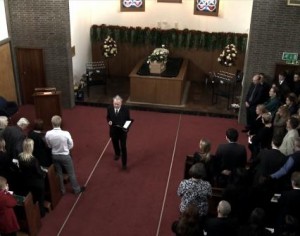
But I also, to – you’ve got to bring some sense of climax, there
was no committal, so, if we had committed, I would have gone
back to the front, and then I would have said Lucretius as we
lowered the coffin. So everyone went: ‘We come together as one
body – pun intended – we speak as one voice to say farewell’, so
it gives a symmetry, and you coul-, yeah, it’s like a [spar?],
you know, blah-di-blah, it gives a symmetry and high point, or
not, low point, whichever your viewpoint, of the ceremony. And
then once you sit down, you can – ‘Phew, we’ve done it’. Because
I – and we emphasise, and I often say to ‘clients’, as we have
to call them, what I like about the humanist [or] non-religious
ceremony is we admit it’s awful, there’s that gap, that person’s
gone, and that gap will always be there, and you have to learn
life will always be different, his loss will always be felt, but
he’s in all of you, and your actions and memories etc. Not the
fact that, ‘Oh, they’ve gone to a better place’. When I was ear
wigging a ceremony at Honor Oak the other day and it was an
evangelic, and she’s going [adopts OTT voice] ‘We’re here to
celebrate–’, and [inaudible] says ‘What?’, [I] said – ‘the life
of Angela, who was taken from us at the age of 28 in a car
crash. But let’s celebrate, because she’s gone to a better
place!’ And I just thought – that’s unbelievable.
Whether the family had comfort from that, I don’t think so. It was a life cut short. Which is why I love the Montaigne quote, which is a little bit of lecturing, you know – ‘Pay good heed as to whether you live your lives honourably, with compassion and with love...’ Because I like the way that, this Middle East unrest, you know, ‘the worst of the non-believers’ – but surely we can say – we have great belief, belief in human nature, human kindness, you know, human collaboration, and understanding – that is our belief.
ME: You mentioned that the, being true to the person was very important for you, how you might go to see a family and they say ‘Well this is, you know, we’re not going to the vicar because that wasn’t him, that wasn’t her’. So there’s a real sense that the authen-, it has to be authentic to the person.
BJ: To the bereaved, [inaudible], the mourners. Yeah, yeah, I think you’re right.
ME: But do you think, is there something that’s – other than the absence of an afterlife, although maybe that’s, [admittedly] that’s quite a bit, but what makes – Well, let me ask you this: what makes a good funeral?
BJ: Ah, well as a musician, it’s like a gig, sometimes it’s the unknown X quantity. I just done two brilliant funerals – three brilliant funerals. Ah, [small pause] you can’t say, I mean, one of them, they had three – he was a journalist, as I mentioned – and three really good journalists that had written beautiful words and delivered them wonderfully, so that helped a lot, because words from me, they’re not as funny, but if they come from the family, they really appreciate that. For me, it’s maximum laughter, maximum tears.
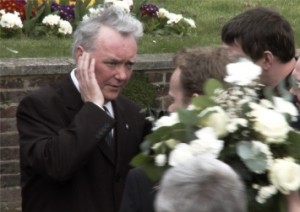
Post ceremony words of balm....
And as a musician, I’ve always, and as a performer, I’ve always had those two masks of comedy and tragedy, and I like to play off them, and one for example as a musician, when I’d been working in Vienna for a week, different projects, and I was a bit homesick, and my twin daughters had said ‘Daddy, you promised never to go away on our birthday, and now it’s our 11th birthday, it’s the fourth time you’ve missed our birthday.’ So I was singing, I was homesick, I’d lost me falsetto, and lost my harmonica, and I was playing, and I was singing a sad song and it made me cry. And I come off stage and this Viennese lady come up, she said ‘that was fantastic’, she said, ‘Oh, I was crying’, I said ‘so was I’, she said ‘yeah, tears of laughter’. Yeah, I was really upset, you know, so [that worked], [so] I’d written really sad pieces of music, like one called ‘Cooking Oil’, about the Spanish cooking oil disaster in the 80s, [I go] cello, very sombre, and the dance accompaniment created by a dance group turned out to be the funniest thing I’d ever seen, you know, hilarious. And I love that, so that that makes a good funeral to me. So you’re touching both extremes.
ME: And what should a funeral accomplish, laughter and tears, but ah...
BJ: I think that you’ve done, you’ve done the final obligation
for that person we-, as well as you possibly could.
When we did Richard (my father-in-law), he was a former captain
of the bowls club, you know, lawn bowls, that’s where I met
Jill, on the green. So at the same crematorium we had four
symbolic woods, we set the jack up, and we asked the current
captain to bowl a wood, and then we asked the champion to bowl a
wood, then we asked a former president of the club to bowl– the
last person, 90-year-old Madam President Mary Scott, devout
Catholic, came up and she won, she got it in the jack – ‘Yeah!’
– you know. And so he went, my dad’s funeral, 2009, that was
really hard, because that was in the church where I lost my
faith and I had to deliver the address, which was very funny.
But I pulled it off, respectfully, because I hold my dad close
[inaudible]. And my brother-in-law just died just before
Christmas, 54, and it was God-lite, because my sister’s [a
believer?], but the guy [priest] did really well.
All of them, we feel great comfort of closure. Jill really misses her dad, she’s an only child, loved her dad dearly, she still misses him, 18 months further on, but we know that, but there is that comfort that it was a flippin’ brilliant day. We took them all back to the bowls club, got them drunk on champagne, and ‘Richard’s last roll-up’, everyone was on the green, bowling [inaudible], 80 people [pause]
I was thinking that there’s a couple of people, bereaved people that would be happy to talk to you, Harry Brown in particular, who I did on Wednesday, his wife – this was a rebooking one, I did Tom Yarde, a man who dropped dead on holiday aged 54 two years ago, and now –and Harry, the brother-in-law, sent me a box of wine as a thank you. Whoa. He emails me a couple of weeks ago: ‘My wife’s just died’. 66. But she was a committed lifelong teacher, he was a teacher, and he’s a very sweet man, I’m sure he would happily talk to you. I just emailed him back saying, as I sent him the copy – I said ‘will you please stop organising perfect funerals, I don’t ever want to see you again.’ He would be happy to discuss [ritual] and...
ME: That would be very helpful, I think.
BJ: I think it would be helpful for him, he’s very raw and tender as well. Harry Brown, [his name is,] I’ll email him.
ME: Ok. Now maybe we can just talk a bit about the funeral today. I noticed, I mean, you explained your approach to language. I know that some celebrants, or officiants, don’t, are not comfortable using words like ‘spirit’ and so on and so forth, ‘spirit’ and ‘soul’ and, but I noticed you...
BJ: –Yet they love ‘love’ songs! It’s nonsense, it’s all metaphor. I find it very mealy-mouthed and narrow- – and they’re the ones that probably say ‘My name is Jane Smith, I’m here on behalf of the–’. I never mention my name, it’s in there, but I never, that’s irrelevant, you know.
ME: Yeah, right. It’s not about you.
BJ: No. And–
ME: But so you said this one was a bit, the family was, you didn’t feel like everything kind of quite gelled right, but what – I mean, maybe you can talk me through your approach to doing a funeral, and maybe just use this one...It sounded like what you said was partly a mix of obviously very specific things, in relation to the person, but also some, you know, kind of, core things that you might say every time, is that [inaudible] the case?
BJ: –Yep, I mean you break it down into a top and tail. What I’ll do – it’s actually really handy my BHA colleague was here today, because I’ve sent her a complete breakdown of the whole approach to this funeral, so I’ll send that to you, the whole process, I don’t need to tell you it now. [he sounds like he’s doing something like preparing some food as he speaks here] Yeah, I mean I roughly top and tail, and I say – there’s about a thousand words procedural, you know, top and bottom of the ceremony, and then you’ve got the tribute, which, you know, they contributed their little bits, and I created the rest from what I talked to the eight people I met. And then I read it through to them, and I say – because it’s written for oration, and if you start sending them the script upfront they start tweaking it, often not for the best.
ME: So do you do that in person, or on the phone?
BJ: No, I go to visit them in person, [which is really] an hour
and a half meeting, and then I phone them a few days before, and
go through it with them. And they tweak things, and it also
empowers them that they are creating the ceremony themselves,
which in a way they are, I’m just the, the M.C. [pause]
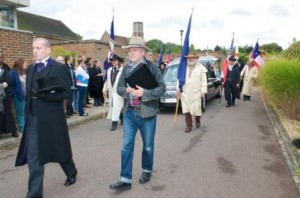
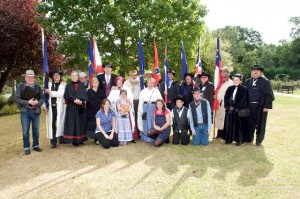
Wild West funeral for Bill ‘Two Persons’ Stone.
ME: And how do you, how did you come up with, you know, the
top and the tail, you know, you quoted Montaigne, and you said
some things about life and death, and you spoke about going
from timelessness to life–
BJ: –Yep, that’s Lucretius. Yeah, you just learn, and pick up
scripts, you’ve got your, I’ve got me little library of [I’m not
sure], little funeral poems and all that...I’m not, I’d rather
write, I don’t use too many of other people’s poems. And many
people, particularly where we work here in northwest Kent,
there’s not that many people are mad about poetry, unless it’s
quoting Frank Sinatra. Like we had Barbra Streisand, Cats,
Andrew Lloyd Webber coming in. It’s funny, it’s the Hallmark,
what I call the Hallmark words that get you, and this one, Harry
Brown, the Don Williams song, ‘You’re My Best Friend’, it’s real
country and western corn, but it’s so powerful.
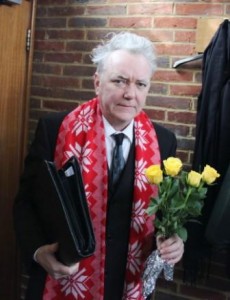
And as it happened, I said – would the immediate family like to
place a flower on the coffin? –and [he] said ‘Ooh, no, we
couldn’t cope with that’. But they did. So they all came up, and
we had a little moment of silence, and they all came up and put
the flower on the coffin. I said, just, I said, quiet, said ¬–
just stand there, stand there. And then I read this, from
husband to his late wife, the Don Williams words, you know,
‘Most of all, you’re my best friend, you put a ring on my
finger, and...’ And ever so sweet, because they stood, if that
was the coffin, they stood like that [gestures], so they kept
the sightlines free for everybody. If I thought I should have
got them to go round the coffin, but it was so sweet.
And you find those Hallmark moments quite hard sometimes. I love it when, you know, like what Kath said, if I had to read what she said, it would be... where is it? [looking for a piece of paper] ... You know just, just little words, I’ve had like 17 children and grandchildren, all with one line each, saying ‘We miss you, Grandma and Mummy, [you’re] the best’. So what I say – look, what we’ll do, is post them in [inaudible] [I think he’s indicating that he tells them to give him what they’ve written]. You know, and I’ll sort of summarise it. Or I give them a nice printed copy with all the words and lyrics, and I put them [all in]... as a strange keepsake.
Oh, yeah, that was [Kath], yeah, yeah. Shall we just sit down? [I think he’s showing ME a piece of paper]
I’ve had some, like an academic couple, and they – ‘We don’t want an–’ – oh, no, it was a different one, no, someone else – ‘We don’t want any preachy stuff, we don’t want any reference to anything’. So, again, [inaudible,] absolutely nothing, like, even though I’m from the British Humanist Association. And she wanted – particularly, she wanted the whole thing sent to her in advance. But that’s their way of – you gotta let ’em. Because you have to lead people through what – they’re in shock, often. I’m very careful in everything I do to spell it out carefully, so they understand. I mean, the letter I send or the email I send, or phone call, and the actual ceremony itself – you lead them through it. And you’re trying, you’re trying, if there’s a lot of people really upset, you’re just trying to comfort them, and get them through this ritual, which has to be done.
Although I did one bloke’s funeral, his wife had died – you know, he’s late forties – his wife had died of cancer at home, which of course...[he was a real] bloke, real bloke – and his son had already died, aged 21. And so they didn’t even have a ceremony, they just went to the pub at the time of the funeral. And this one, he – I gave him the words, he just walked out and sort of [almost] chucked it in the bin, he just didn’t want to know, that’s his way of coping.
ME: Just two more questions. One, I mean you made it – I listened to the link you sent me, where you played some of your music, and you talked about your music, you’ve talked a bit about your music career here today. I know your BHA colleague is an actor, Steph said she is an actor, but for you, how is your life as a musician connected to your life as an officiant?
BJ: I can email you that, again, I’ve mapped that out. There’s a lot of, awful lot of parallels, and it starts in the dressing room, you know, where you put your coat, you know. I’m in there before, loosening up, [up] stretching, voice warm-ups, checking the script, you go out on the stage – it’s all exactly the same. Cept you don’t have to tune your – well, you tune your voice up I suppose.
But it’s a lot more challenging and rewarding to bring people
from real bottom, to try and address the issue. Because I always
feel those who have faith, they must, [there is] sometimes –
it’s harder for them, because they’re wondering whether that
person’s all right – where have they gone, are they okay, have
they gone...? [slightly laughs] You know? I think there’s a
purer – people like Harry Brown for example, there’s no doubt,
you know – that that’s it, you know, it’s just one life you’ve
got, and there’s a sort of purity in their grief. You know, it’s
going to be awful for him, for the rest of his life, he’s late
sixties or something. But there’s an acceptance of it. And even
his wife said, when she was dying, said, cos she, with cancer,
‘It’s ironic that my own body let me down, I wasn’t taken by a
bad car crash, or [being stabbed or something], [inaudible].’
ME: Well, just one last question I had, which is the, in relation to the BHA and the network. How does the network work? I mean, I know, from what I understand, a lot of, in terms of getting funerals, people maybe [BJ makes inaudible interruption, possibly not relevant to conversation] finding out about you will be partly through funeral home directors, or...?
BJ: –Funeral directors. And we’re doing an audit at the minute, and in our, of the nine of us, we pinpointed over 100 funeral directors that we’ve had work from. It’s a high, large amount – imagine if we were getting one a week from everybody, we’d all be doing ten funerals a week, which...It works really well for us, because we’re a happy team, we help each other, we have an online diary, so we, you know, if the phone rings, and I say ‘I’m sorry, I’m not available, but I’m pretty sure that Mark Hayford, he can cover [inaudible] that day’. We meet quarterly–
ME: So the southeast group meets quarterly?
BJ: Yes, and we were, like, all south London till a couple of years ago, and we realised as travelling doesn’t get any easier, we don’t want to go that-a-way and they don’t want to come this-a-way, and in theory, funerals are on the rise, as are – but I think they’ve been the pathfinders of humanism, and everyone else is learning from the way they’ve developed the funerals, so we’ve got – you know, [there are] all these different factions, the independents, you’ve got Civil Ceremonies – I don’t understand – well, I can understand there’s been people who’ve pulled away from the BHA because of political reasons, but I’m more than happy to give my levy to them to help the common cause anyway. So, I would never not want to do that. So local, we help each other, and we converse with other local, certainly the south or west London lot. There’s a river – you probably know that – there’s a north-south river divide here in London, which I love, and I’m proudly south, southeast London. And they charge more over there, we charge more sort of socialist amounts. Because we – you can’t charge for babies [if they haven’t earned], or kids, you know, which is quite ironic, because they’re pretty tough jobs.
And then at the national level, you’ve got the, phone call away, you know, you got – I haven’t spoken to Ben Siegal [incoming BHA Head of Ceremonies] yet, but Tana Wollen [outgoing BHA H of C] was amazing, the way she kicked it into the modern world. I do get a bit confused with the humanist logo and the Starbucks sign sometimes, because of all this corporatisation...I went on [the] mentoring course, and that plunged me into depression for three days, I’ve been given 40-page documents on how to communicate [with someone], I found rather, very hard to tolerate.
ME: Yeah. Well, anything that you want to add that you think I need to know at this point, or...?
BJ: I don’t think so, I don’t think so. I’ll leave [any] comparisons with performance, and I’ll send everything about the ceremony, okay?
ME: That’s great. Thanks a lot, Billy.
©2011 Matthew Engleke
